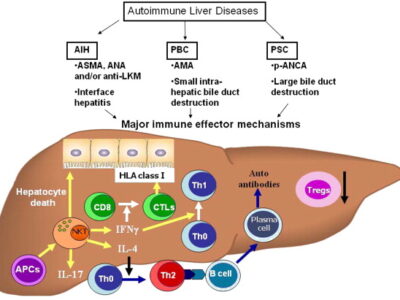Autoimmune liver diseases are typically long-lasting and recurring (chronic) conditions. This means that you may experience persistent immune system attacks that destroy liver cells. As cells die, scar tissue known as fibrosis forms. Autoimmune diseases tend to progress slowly, and you may have long periods without symptoms. When scarring (fibrosis) becomes extreme, liver function weakens and eventually may result in a condition known as cirrhosis. Cirrhosis is also known as liver failure or end-stage liver disease. The only cure for this condition is organ transplantation. While the only cure for severe cirrhosis is transplantation, we can help you manage the symptoms of the disease with medication before or instead of transplantation.

Symptoms
- Although a number of autoimmune conditions may involve the liver, the three most common autoimmune liver diseases are autoimmune hepatitis, primary biliary cholangitis and primary sclerosing cholangitis. These conditions may occur individually or as part of “overlap” syndromes.
- Autoimmune hepatitis (AIH): can affect both children and adults and can lead to cirrhosis and acute liver failure. It is often asymptomatic, with no symptoms prior to liver failure. It may also be associated with nonspecific symptoms including fatigue, nausea, abdominal pains, or joint pains.
- Primary biliary cholangitis (PBC): occurs when the biliary ducts within the liver are destroyed by the body’s own immune cells, impairing the liver’s ability to excrete bile. It affects women more often the men. It may be asymptomatic or may be associated with symptoms such as fatigue, itching, dry mouth, dry eyes, high cholesterol or bone disease. It may occur in association with other autoimmune conditions. If left untreated, PBC can lead to cirrhosis and liver failure.
- Primary sclerosing cholangitis (PSC): is characterized by inflammation and scarring of the bile ducts, which can prevent bile from passing through. Like other autoimmune liver diseases, it may be asymptomatic or may be associated with symptoms such as itching or jaundice. PSC can affect both children and adults and is frequently encountered in association with inflammatory bowel disease. Complications of PSC include liver, gallbladder and bile duct cancers, as well as biliary infections and cirrhosis.

